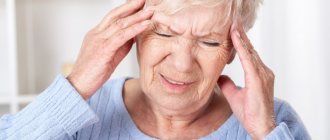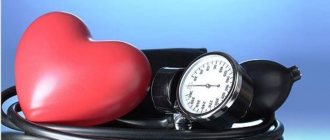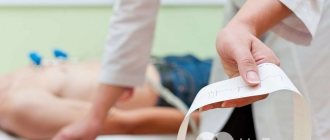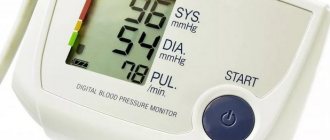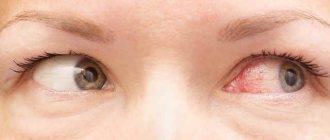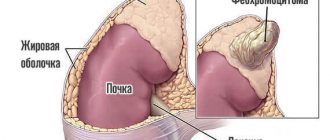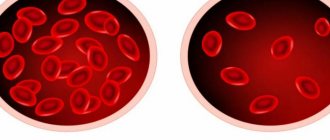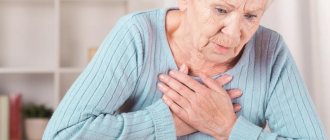Today, many older people over the age of 60 have low blood pressure. Unfortunately, not everyone knows what to do in such a situation. This is explained by the fact that, on the contrary, hypertension is more often observed in older people. You can fight it in various ways, and they are quite well known.
However, for some people it may be too low all the time. Jumps also often occur, during which a person’s condition sharply worsens. The norm for this age category is considered to be 135/80. If it drops significantly, then it is important to urgently take appropriate measures.
What does low blood pressure mean in older people?
Hypotension (hypotension, low blood pressure) is a decrease in blood pressure by more than 20% of normal.
Unlike hypertension, low blood pressure is observed less frequently in older people, but definitely more often than in young people.
In a healthy person, the readings are 120/80 mm Hg. Art. When these values are slightly reduced, this is also considered normal. For most people 100/70 mmHg. Art. is not a pathology, this is their normal blood pressure throughout life. The indicator is less than 100/60 mmHg. Art. and a sharp deterioration in health indicate a situation in which medical attention is needed. For women, this value is 95/60 mmHg. Art. For older people, the readings drop to 105/65 mm Hg. Art. is a signal of unhealthy processes in the body.
This can be either the individual characteristics of a person or the manifestation of a disease. Some older people do not experience discomfort due to decreased readings. For them, this is a normal physiological process, a congenital trait. This condition is referred to as the primary form of hypotension.
If a person has low blood pressure and at the same time feels unwell, this indicates the presence of diseases in which blood pressure regulation is disrupted. This condition is called pathological hypotension.
Quite often, hypotension is a consequence of:
- dysfunction of the heart muscle (heart failure);
- intoxication;
- blood loss;
- taking medications;
- infections;
- excessive physical activity;
- weather changes.
In such cases, we can talk about secondary hypotension, especially if a decrease in blood pressure leads to a deterioration in well-being.
We recommend
“Why blood pressure drops in older people: causes and treatment” Read more
How to increase blood pressure: methods and means
According to specialists at the Dacha boarding house in Murino, hypotension is often a sign of a disease, so first of all you need to find the root cause. If the cause is internal pathology, the indicators will not decrease until the problem organ is cured.
Medicines
Antihypotonic drugs will quickly raise blood pressure at home: caffeine, citramon, mezaton, dobutamine, papazole, etc. Before taking a pill, you need to make sure that a person’s blood pressure is low, so you should definitely check it. This is necessary because high blood pressure causes similar symptoms. The attending physician will prescribe suitable tablets.
If a person has chronic hypotension, the problem must be solved comprehensively. The patient needs to adjust his lifestyle, change his diet, add suitable physical activity, and, if necessary, consult a psychotherapist. Complex treatment will help raise blood pressure. It is prescribed by a specialist.
Nutrition for people with low blood pressure
For a person with hypotension, these dietary recommendations will help raise low blood pressure:
- Eat often and in small portions. Number of meals – 4-6 per day.
- Fluid consumption is at least 1.5 liters per day.
- A hearty breakfast is useful - it will help bring your levels back to normal, which are often low in the morning. Include sandwiches with salted cheese, butter and a cup of black tea or coffee in your breakfast.
- Between main meals, you can have healthy snacks if you feel hungry. You can snack on nuts, apples, yogurt, etc.
- The diet should consist of foods rich in nutrients and vitamins.
- You should include salty foods in your diet in moderation: they will help raise your blood pressure.
- If you have diabetes, you need to constantly monitor your sugar levels.
Foods that increase blood pressure
For chronic hypotension, it is useful to include foods from this list in your diet. You can easily and safely increase and maintain blood pressure at home using them.
- Strong tea or coffee. Caffeine will dilate blood vessels. In addition to increasing blood pressure, the person will be cheerful and in good shape. But this method is suitable for those who rarely drink coffee. Coffee regulars become addicted to caffeine, and the desired effect will not occur.
- Cinnamon with honey. Half a teaspoon of cinnamon should be dissolved in a glass of boiling water and add a little honey. The drink is infused for half an hour and then drunk.
- Seafood: add mussels, red caviar, shrimp to the menu.
- If your blood pressure drops sharply, you can eat something salty: cucumbers, nuts, etc.
- Glucose: you can eat a piece of refined sugar.
- Cognac and red wine can increase blood pressure. You can drink no more than 50 g per day if you receive permission from your doctor and do not abuse it.
- Low blood pressure is often caused by a lack of iron. If this is the reason, it is useful to add liver, pomegranate, green apples, and buckwheat to your diet. You can also take iron-containing foods.
- Vegetarianism and lack of meat have a bad effect on blood pressure. If a person refuses to eat meat, he needs to make up for this deficiency with eggs and dairy products.
Useful Herbal Remedies
These remedies will help normalize blood pressure at home:
- Take ginseng tincture for a month. Dosage: 15 drops three times a day before meals.
- Birch juice. One glass of juice a day is enough.
- Aloe juice. Take 1 tsp. twice a day.
- Juniper berries. Start by taking 4 berries, increasing the number to 15.
- Bay leaf. Grind the bay leaf into small pieces and place under the tongue. You need to suck it for a few minutes, then spit it out.
- Valerian tincture will help raise systolic blood pressure. To raise diastolic blood pressure, you can take motherwort.
- Half a glass of beet juice a day will improve your performance and also cleanse your blood.
- Eleutherococcus tincture. It should be taken three times a day, 20-30 drops. The tincture is mixed with water and drunk 15 minutes before the start of a meal. The last dose takes place no later than four hours before bedtime. The entire treatment lasts up to a month; if necessary, it can be repeated after 2-3 weeks.
- Schisandra tincture. Drink 20-25 drops diluted in water twice a day in the first half of the day before meals. Drink for three weeks, then take a break of two weeks and you can repeat.
Physiotherapy
Massage of the whole body, as well as arms and legs, and acupressure on individual places helps well. Physiotherapy also includes electrophoresis with drugs, galvanization, ultraviolet irradiation, decimeter wave therapy, balneotherapy, and cryotherapy.
Causes of low blood pressure in older people
Often, hypotension is not a separate disease, but a manifestation of it. Therefore, it is necessary to treat the disease that led to the state of low blood pressure. It can be:
- Cardiovascular diseases. The contractions of the heart cause blood to circulate throughout the body. Due to organ diseases (heart attack, cardiosclerosis), the heart rhythm is disturbed, therefore, the speed of blood movement decreases. Along with low blood pressure, lethargy, weak pulse, cough, and shortness of breath appear.
- Stagnation of venous blood in the vessels of the lungs (cardiac asthma). In this case, hypotension occurs after physical activity or severe anxiety. Pallor of the skin, lack of air, and cough occur.
- Pulmonary edema. Reduced values are accompanied by bluish skin, the appearance of foaming sputum and swelling of the venous vessels in the neck.
- Inflammatory infectious processes (acute tonsillitis, aggressive periodontitis). The pressure disorder occurs against the background of fever or chills, pain, lethargy, and insomnia.
- Allergy. Minor rashes or colds do not provoke hypotension. But if low levels are associated with anaphylaxis, then this is an alarming situation that threatens a person’s life. Anaphylactic shock can be recognized by the following signs: fainting, tightness and pearly color of the skin, shortness of breath. In this situation, you must immediately give medicine and call a doctor, otherwise the patient will die.
- Dysfunction of the autonomic nervous system (vascular dystonia). Indicators for this disease decrease to 80/40 mm Hg. Art.
In addition, the occurrence of hypotension in older people may be preceded by hormonal imbalances, neurology, tumors, pulmonary diseases, dysfunction of the spinal cord and brain.
A decrease in normal pressure parameters also leads to:
- bad habits (alcohol, smoking);
- deficiency of nutrients and vitamins in the body;
- frequent hunger strikes.
We recommend
“Low blood pressure in an elderly person: treatment and prevention” Read more
High blood pressure
Every year, the number of elderly people diagnosed with hypertension in the world increases. Some people themselves provoke the disease by disrupting their diet and neglecting a healthy lifestyle. Age manifests itself through changes in the functioning of organs:
- Hypertrophy of the walls of arteries and capillaries is revealed;
- Cardiac output decreases;
- The kidneys do not completely remove excess fluid from the tissues;
- Blood circulation slows down;
- The volume of intracellular fluid increases.
In addition, a number of other concomitant pathologies are revealed, against the background of which the body weakens. As a result, pressure often fluctuates, which is not noticeable without the use of instruments.
Causes of increased blood pressure
To cure hypertension, you need to find the root cause that led to the increase in pressure. If it rises only once, then doctors note hypertension. In this case, you will have to remove the factor that provoked the appearance of symptoms. With a sustained increase in blood pressure, we are talking about the presence of a full-fledged disease in the patient.
The reasons for increased blood pressure in mature individuals are quite varied:
- Overweight;
- Stress and anxiety;
- Low mobility;
- Smoking and drinking alcohol;
- Hereditary predisposition;
- Unbalanced diet;
- Taking medications that increase blood pressure;
- Existing diseases.
Symptoms of high blood pressure
Almost no one can reliably determine for the first time when the pressure surge occurred. The disease begins asymptomatically. Even if dizziness is noted, older people simply attribute this condition to fatigue and changes in weather.
In the absence of treatment, changes in blood pressure are repeated systematically. At an advanced age, its pronounced symptoms are observed:
- Nervousness;
- Constant headaches;
- General impotence;
- Cardiopalmus;
- Nose bleed.
Other less frequently identified signs include decreased performance and loss of interest in what is happening. Some people's limbs go numb, and some people lose their appetite. With high blood pressure, vision deteriorates, and complete blindness often develops.
Recommendations
Elderly people who have high blood pressure should immediately go to the clinic.
You can visit a therapist or gerontologist (a selection of geriatricians with a rating), who, if necessary, will prescribe a number of additional examinations and tests. The doctor draws up a medication regimen and the exact dosage. To stabilize the condition, medications belonging to different groups are prescribed. Blood pressure cannot be stabilized with drugs alone until the irritating factors are eliminated. The doctor gives advice:
- Limit consumption of salty foods;
- Eat a balanced diet, excluding fatty and fried foods;
- Avoid drinking alcohol;
- Play sports, take walks;
- Lose weight.
You need to measure your blood pressure every day and keep a hypertensive diary. You should not try to find out from neighbors or on forums what to do if a hypertensive crisis occurs. If problems are noticed, you should consult a doctor.
Symptoms of low blood pressure in older people
With hypotension, the patient notes a ticking pain in the temporal lobes, sometimes in the front and back of the head, and migraines are also possible. Such severe pain can provoke vomiting and nausea.
Headaches are characterized by alternating intensification and weakening of sensations. Factors in the appearance of aching pain can be excessive exercise or a sudden change in weather conditions. A person’s vision may suddenly darken; this often happens when quickly getting to their feet. Loss of consciousness is possible.
If older people continue to work, then with low blood pressure they may experience severe fatigue in the evening, and at the end of their working days they may simply collapse. Such overwork is accompanied by weakening of attention and the appearance of nervous tension.
Frequent yawning due to lack of air is also a sign of low blood pressure.
Potential warning signs of hypotension include:
- loss of strength, constant desire to sleep or vice versa, insomnia;
- nervousness, irritability;
- loss of sensation in the arms and legs;
- fast heart rate;
- sweating;
- dyspnea (feeling of lack of air);
- inability to think clearly;
- amnesia;
- pain in the chest.
Sometimes, against the background of these factors, an elderly person’s blood pressure drops sharply; in medicine, this phenomenon is called a hypotensive crisis. This may be preceded by the following signs:
- symptom of vertigo (dizziness);
- dull sounds in the ears;
- pallor;
- perspiration;
- dullness in the eyes;
- loss of consciousness.
We recommend
“Dementia in older people: symptoms and treatment” Read more
Symptoms of hypotension
A person is ready for physiological hypotension, so strong discomfort does not bother him.
Secondary hypotension is characterized by:
- Dizziness,
- Weakness, drowsiness and lethargy,
- Heavy sweating
- Pallor of the skin,
- Fainting.
The following conditions may occur:
- Pain in the frontal and temporal areas;
- Unhealthy heart rhythm;
- Feeling of lack of air;
- Darkness in the eyes with sudden movements;
- Decreased performance;
- Apathy;
- Increased discomfort with changes in weather.
Consequences of low blood pressure for an elderly person
Older people with high blood pressure are often susceptible to heart disease. But, in turn, the process of hypotension reduces the elasticity of blood vessels. Hypotonic patients are more susceptible to cerebrovascular accidents (coronary artery disease).
In older people, deviations from the norm often occur during the process of abruptly rising from bed or chair. This is the so-called orthostatic hypotension.
Due to low blood pressure, blood circulation is disrupted, and, consequently, nutrients and oxygen do not fully reach the organs, including the brain. All of these can cause Alzheimer's disease in older people.
But do not panic, hypotension rarely leads to irreversible consequences, with the exception of very old patients. Competent therapy will help bring your health back to normal.
We recommend
“Gymnastics for the elderly: the best exercises for various diseases” Read more
Recommendations for hypotensive patients
In order to quickly bring blood pressure back to normal, hypotensive patients must follow useful rules.
- Lead an active and healthy lifestyle. Any suitable physical activity is encouraged: Nordic walking, running, swimming, moderate work in the garden, etc.
- Get out into the fresh air often and go for daily walks.
- Get enough sleep. Hypotonic people are recommended to sleep longer than healthy people. 9 hours daily at least. This will help you feel good in the morning and keep your levels normal.
- Avoid severe stressful situations. If necessary, contact a psychotherapist.
- Stick to a healthy and healthy diet for hypotension. You need to have a hearty breakfast. You cannot exclude salty and fatty foods from your diet.
- Don't overwork or overwork. Work should be moderate.
- Drink plenty of fluids.
- Maintain immunity at a high level, increase it if necessary.
- Immediately treat emerging infections and viral diseases.
- To refuse from bad habits.
These recommendations were provided to us by a nursing home in the Leningrad region; they will help maintain healthy blood pressure at home, as well as the condition of the whole body.
Methods for treating low blood pressure in older people
Decreased levels are normal for some older people and they may live with them all the time. In such cases, treatment is not prescribed; on the contrary, measures to raise blood pressure can significantly undermine health.
A person with an acquired form of hypotension needs treatment, as complications may arise. Doctors prescribe medicine for older people for low blood pressure, which constricts blood vessels and raises blood pressure levels. You cannot take medications on your own without consulting a doctor.
Let's figure out what to do with low blood pressure in older people over 60 years old.
If there are signs of hypotension, the patient needs to be kept at rest and placed on a flat surface. In a horizontal position, blood flows into the vessels of the brain faster, and the pressure normalizes. It is important that the head is not higher than the body, otherwise blood circulation will slow down. If it is not possible to put him to bed, for example, a crisis occurs in a public place, then the elderly person must be seated and his head lowered forward. You should remain in this position until the ambulance arrives.
At 60/40 mm Hg. Art. You must immediately call a doctor, as this condition is life-threatening.
Signs of low blood pressure vary in older people, therefore, treatment is chosen after determining the causes.
1. To activate blood flow to the brain and maintain clarity and flexibility of mind, Glycine, Pantogam, Piracetam are prescribed.
2. To increase blood pressure, take Gutron, Fethanol, Mezaton, Regulton.
3. The lack of oxygen in the cells is compensated by Cinnarizine, Actovegin, Vinpocetine.
4. Calming therapy includes Novo-Passit, Fitosed, Persen.
5. To boost immunity, vitamins and mineral complexes are prescribed: B, C, E, phosphorus, iron, magnesium, calcium, potassium.
If hypotension occurs suddenly, you can take:
- Tonginal;
- Citramon;
- tincture of eleutherococcus;
- caffeine;
- tincture of ginseng root.
If none of the above helps, you should call a doctor.
Traditional medicine also helps well with low blood pressure. You can make decoctions, tinctures with medicinal herbs (St. John's wort, milk thistle), drink warm water with honey and lemon, eat more dried apricots and celery.
We recommend
“Depression in older people: types, symptoms, prevention” Read more
conclusions
Low blood pressure can accompany a person from a young age, or may appear later as one of the symptoms of internal problems. In any case, an elderly person should not let a situation with low blood pressure take its course: at this age, such an attitude is fraught with problems.
If you adhere to a healthy lifestyle and special advice for hypotensive patients, there will be no health risks. Advice for hypotensive patients will be beneficial not only for low blood pressure, but also for the health of an elderly person in general.

